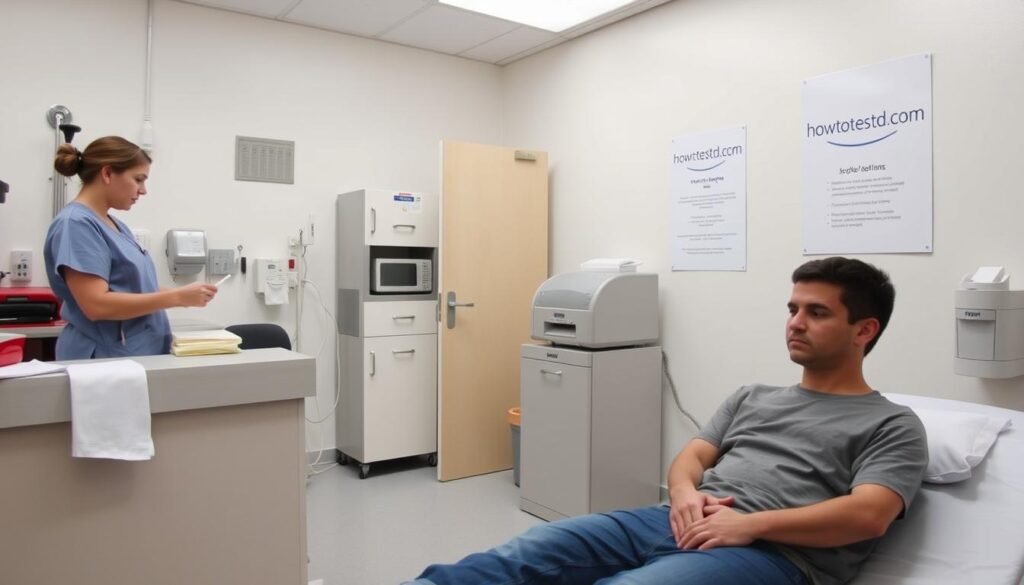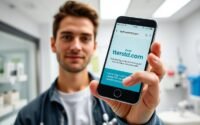Find Free STD Testing Locations Near Me
Did you know millions in the U.S. have STDs without knowing? It’s important to be proactive about your health. Getting tested is a big step.
There are many places where you can get free or low-cost STD testing. You can go to your doctor, community health clinics, local health departments, or Planned Parenthood. It’s key not to wait if you’re at risk.
Using these resources helps keep you healthy. Don’t wait – find a testing place today and take care of your health.
Key Takeaways
- You can get tested for STDs at various healthcare facilities.
- Free or low-cost testing options are available.
- Being proactive about your health is important.
- Don’t delay getting tested if you’re at risk.
- Resources like Planned Parenthood offer testing services.
The Importance of Regular STD Testing
Regular STD testing is very important. Sexually transmitted diseases (STDs) are a big health problem in the US. Millions of new cases happen every year.
Many STDs don’t show symptoms right away. So, it’s key to test often for early detection and treatment.
Understanding STD Risks and Prevalence in the US
STDs are more common than you might think. The CDC says there are about 20 million new STD infections each year in the US. Young people aged 15-24 get nearly half of these cases.
Chlamydia, gonorrhea, and syphilis are top STDs. Their high numbers show why regular testing is so important, mainly for those who are sexually active.
Why Early Detection Matters for Your Health
Finding STDs early is key for good treatment and to avoid serious health issues. Untreated chlamydia and gonorrhea can cause PID, which can make women infertile. Syphilis can also cause serious health problems if not treated.
Regular testing helps you get treatment on time and avoid these problems.
“The only way to know if you are infected is to get tested.”
Looking for STD clinics nearby or using local STI testing options makes it easier to test often. Many public health departments and community health centers offer free or low-cost STD testing services.
| STD | Prevalence | Consequences if Untreated |
|---|---|---|
| Chlamydia | High among young adults | PID, infertility |
| Gonorrhea | Increasing resistance to antibiotics | PID, infertility, increased HIV risk |
| Syphilis | Rising cases in the US | Birth defects, neurological problems, death |
How to Find Free STD Testing Near Me
Finding free STD testing near you is easy. You can go to your doctor, a community health clinic, or the health department. Planned Parenthood also offers these services, even without health insurance. It’s important to check your health regularly.
Public Health Departments and Clinics
Public health departments and clinics offer free or low-cost STD testing. They are funded by the government. You can visit their websites or call them to learn more.
Community Health Centers
Community health centers also provide free or low-cost STD testing. They help people who can’t afford healthcare. You can find them online and see if they offer STD testing.
Nonprofit Organizations and LGBTQ+ Centers
Nonprofit groups, including those for LGBTQ+ health, offer free STD testing. They provide confidential testing and counseling. Look for these organizations in your area for their services.
Using these resources is key to keeping yourself and others healthy. Regular testing helps find and treat STDs early. This can greatly improve your health.
Types of STDs Commonly Tested For
When you get tested for STDs, you’re checked for many infections. It’s important to stay healthy by getting tested. STDs include chlamydia, gonorrhea, syphilis, HIV, herpes, HPV, and hepatitis. Each needs its own test.
Bacterial Infections
Bacterial STDs like chlamydia, gonorrhea, and syphilis need antibiotics. If not treated, they can cause big health problems. These include infertility and a higher risk of HIV.
| Bacterial Infection | Common Symptoms | Treatment |
|---|---|---|
| Chlamydia | Often no symptoms, but can have abnormal discharge | Antibiotics |
| Gonorrhea | Discharge, painful urination | Antibiotics |
| Syphilis | Initial sore, rash, and other symptoms later | Antibiotics |
Viral Infections
Viral STDs like HIV, herpes, HPV, and hepatitis are serious. They can last a lifetime. Some can be managed, but others can cause big health problems.
| Viral Infection | Common Symptoms | Management/Treatment |
|---|---|---|
| HIV | Flu-like symptoms, then a quiet period | Antiretroviral therapy |
| Herpes | Painful sores or blisters | Antiviral medication |
| HPV | Often no symptoms, but can cause warts or cervical changes | Monitoring, vaccination, and treatment for related health issues |
| Hepatitis | Fatigue, jaundice, and liver problems | Supportive care, antiviral medication |
Don’t wait to get tested. You can find confidential STD screenings in your area. They offer a safe and private way to check your health.
What to Expect During Your STD Testing Visit
Knowing what happens during STD testing can make you feel better. When you go to a clinic for affordable STD testing locations near me, it’s easy and private.
Registration and Intake Process
First, you’ll sign up and share some personal and health info. This is key for correct testing and care. You might also talk with a doctor about why you’re getting tested and any symptoms.
Types of Sample Collection Methods
Tests might take urine, blood, or swabs. The type needed depends on the STD. For example, urine tests check for chlamydia and gonorrhea. Blood tests find HIV and syphilis. Getting a sample is usually quick and doesn’t hurt much.

Timeframe for Receiving Results
How long it takes to get your results varies. Some tests give answers in 20-30 minutes. Others might take a few days or a week. Always ask when you’ll get your results.
| Test Type | Sample Required | Result Timeframe |
|---|---|---|
| Chlamydia/Gonorrhea | Urine or Swab | 1-3 days |
| HIV | Blood | 3-7 days |
| Syphilis | Blood | 3-7 days |
It’s very important to take care of your health. Don’t delay getting tested. The cost of STD testing changes based on many things. You might get it for free or cheaper with health insurance.
Online Resources for Locating Free STD Testing Centers
Now, finding free STD testing centers is easy online. The internet helps you find places to get tested for free. This way, you can take care of your health without spending money.
Many government and health websites have tools to help you find free STD testing centers. These include:
Government Websites and CDC Resources
The Centers for Disease Control and Prevention (CDC) and local health department websites are great for finding free STD testing centers. The CDC website has lots of info on STDs. It also has a tool to find testing centers near you.
- The CDC’s STD testing locator is on their official website.
- Local health department websites list clinics that offer free or low-cost STD testing.
It’s so vital to be proactive about your health. Don’t wait to get tested. The Department of State Health Services (DSHS) has educational materials online. You can view, download, or order them from their page.
Mobile Apps and Locator Tools
There are also mobile apps and online tools to find free STD testing centers. These tools are easy to use and help you find testing locations fast.
- Apps like Healthvana and STD Testing App let you search for testing centers by location.
- The CDC’s online locator tool helps you find clinics that offer free STD testing.
Staying informed and using these resources can greatly improve your health and well-being.
Insurance Coverage and Payment Options for STD Testing
STD testing is very important for our health. Knowing how to pay for it can make it easier. Many people worry about the cost, but there are ways to make it cheaper.
STD testing can be expensive. But, there are many ways to make it more affordable. For example, the Affordable Care Act (ACA) helps with the cost of testing.
Testing Coverage Under the Affordable Care Act
The ACA makes sure many insurance plans cover STD testing. This means people with ACA insurance might not have to pay extra for tests.
- Chlamydia and gonorrhea screening for sexually active women
- Syphilis screening for pregnant women and individuals at increased risk
- HIV screening for everyone between the ages of 15 and 65
Sliding Scale Fee Programs and Financial Assistance
If you don’t have insurance or can’t afford it, there’s help. Many places offer STD testing for less money based on how much you make.
Sliding scale fee programs offer:
- Lower costs based on your income
- Access to healthcare without worrying about money
- A safe and private place to get tested
It’s important to take care of your health. Don’t delay getting tested. STD testing is often free or cheap with government programs. And, some places like Planned Parenthood offer free or low-cost tests based on your income.
![]()
In summary, while STD testing costs can be a worry, there are many ways to make it more affordable. By understanding these options, you can take care of your health and wellbeing.
Confidentiality and Privacy Concerns with STD Testing
Keeping STD testing private is very important. It helps people feel safe to get tested. Many clinics offer confidential STD screenings in my area. They make sure your personal and health info stays private.
Many STD clinics nearby also offer free or low-cost tests. This helps more people take care of their health. They don’t worry about the cost or privacy.
HIPAA Protections for Medical Testing
The Health Insurance Portability and Accountability Act (HIPAA) helps keep your health info safe. HIPAA makes sure your medical records and personal health info are protected. Only people who are allowed can see this info.
The U.S. Department of Health & Human Services says HIPAA is key. It protects your health info and gives you rights over it. This builds trust between you and your healthcare team.
Anonymous vs. Confidential Testing Options
When you get STD tested, you might choose between anonymous and confidential testing. Anonymous testing keeps your identity separate from your test results. This adds more privacy. Confidential testing keeps your results private but links them to you. This lets you get the care you need.
Both choices meet different needs. They make sure you can get tested while keeping your privacy. A health expert says, “Choose based on what you’re comfortable with and understand the differences.”
It’s very important to take care of your health. Don’t delay getting tested. With many clinics that offer free or low-cost, confidential tests, there’s no reason to wait.
At-Home STD Testing Alternatives
At-home STD testing kits are a private and easy way to test for diseases. They let you test for STDs in the comfort of your home. This is a good option if you don’t want to go to a clinic.
Mail-In Testing Kits and How They Work
Mail-in kits are simple to use. You collect a sample, like urine or blood, and send it to a lab. Then, you get your results online or by phone.
Key Features of Mail-In Testing Kits:
- Easy to use with clear instructions
- Confidential and secure processing
- Various test options available (urine, blood, swab)
- Results available within a few days to a week
Reliability, Accuracy, and Cost Considerations
When picking at-home STD testing kits, check their reliability and accuracy. Good kits match the quality of clinic tests. Also, think about the cost.
| Testing Kit | Reliability | Accuracy | Cost |
|---|---|---|---|
| STD Test Kit A | High | 99% | $50-$100 |
| STD Test Kit B | High | 98% | $30-$80 |
| STD Test Kit C | Very High | 99.5% | $100-$150 |
It’s important to take care of your health. Don’t delay getting tested. At-home kits are a good choice. Look at the test type, lab, and price when picking a kit.
Knowing your options helps you make smart choices about your health. At-home testing is a key part of preventing and treating STDs.
Overcoming Barriers to STD Testing
STD testing is important but faces many challenges. Stigma and lack of access are big hurdles. We must tackle these to ensure everyone can get tested.
Addressing Stigma and Embarrassment
Many people avoid STD testing because of shame. They feel embarrassed or ashamed. Education and awareness can help change this.
Knowing that STDs are common helps people feel more at ease. Clinics that offer confidential and non-judgmental services are also key. A study on the National Center for Biotechnology Information shows the importance of a supportive environment.
Transportation and Accessibility Solutions
Transportation issues and distance can stop people from getting tested. Health departments and organizations use mobile testing units to reach communities. Some clinics also offer transportation assistance or are near public transport.
Telehealth services let people talk to doctors online. They can get advice on where to get tested. Visit government health websites or use online tools to find local STI testing options and affordable STD testing locations near me.
| Barrier | Solution |
|---|---|
| Stigma and Embarrassment | Education, Confidential Services |
| Lack of Transportation | Mobile Testing Units, Transportation Assistance |
| Accessibility Issues | Telehealth Services, Local Testing Centers |
By tackling these barriers, we can get more people to get tested. This is key for better public health. Don’t delay getting tested for your health.
Follow-Up Care After STD Testing
When you get your STD test results, it’s important to know what they mean for your health. This is a key part of taking care of yourself after STD testing.
Understanding Your Test Results
Test results can show if you have an STD or not. A positive result means you have the STD. A negative result means the test didn’t find the STD. But it doesn’t mean you’re definitely not infected.
If your results are positive, talk to your doctor about treatment. For questions about HIV and other STDs, call 800-CDC-INFO (800-232-4636) for help.
Treatment Options and Next Steps
Treatment depends on the STD type. Bacterial infections like chlamydia and gonorrhea can be treated with antibiotics. Viral infections like HIV and herpes need antiviral medications.
It’s important to talk to your doctor about your treatment. Being proactive about your health is key. Looking for low-cost or free STD testing can help manage your health.
Conclusion
Getting tested for STDs is very important for your health. This article helps you find free or private STD tests near you.
Being proactive about your health is key. Don’t wait to get tested. Talking openly with your doctor about your health is very important. This can really help your health.
Knowing about STD risks and where to get tested helps you control your health. Use online tools, public health, and community centers for free or cheap tests.
Stay informed and healthy. Find a testing center near you today. Start your journey to a healthier tomorrow.
FAQ
What are the risks of not getting tested for STDs?
Not testing for STDs can cause serious health problems. These include infertility, cancer, and a higher risk of HIV. Many STDs don’t show symptoms right away. So, it’s key to get tested often for early treatment.
Where can I find free STD testing near me?
Look for free STD testing at public health departments, community health centers, and non-profits. These places test you, no matter your insurance.
What types of STDs are commonly tested for?
Tests check for bacterial infections like Chlamydia, Gonorrhea, and Syphilis. They also test for viral infections like HIV, Herpes, HPV, and Hepatitis. Each infection needs its own test.
What can I expect during an STD testing visit?
At an STD testing visit, you’ll register and give a sample for testing. You’ll also get info on when to get your results. Testing might be free or cheaper with insurance.
Are online resources available to help me locate free STD testing centers?
Yes, you can find free testing centers online. Use government sites, CDC resources, and apps. They give info on where to go, when, and what services they offer.
Will my health insurance cover STD testing?
Many health plans cover STD testing without extra costs. Check with your insurance to see if they cover it and what you’ll pay.
Is STD testing confidential?
Yes, STD testing is private and safe under HIPAA. You can choose to test anonymously or confidentially, based on what you prefer.
Can I get tested for STDs at home?
Yes, you can use at-home STD testing kits. These kits let you collect a sample at home and send it to a lab. But, think about their reliability, accuracy, and cost.
How can I overcome barriers to STD testing?
To get tested, face stigma and embarrassment by choosing a trusted provider. Look for ways to get there, like online resources or local centers.
What happens after I get tested for STDs?
After testing, you’ll get your results. If they’re positive, talk to your doctor about treatment and what to do next.
Are there any financial assistance programs available for STD testing?
Yes, there are programs for those who can’t afford testing. Check with local health centers or non-profits to see what help is out there.


